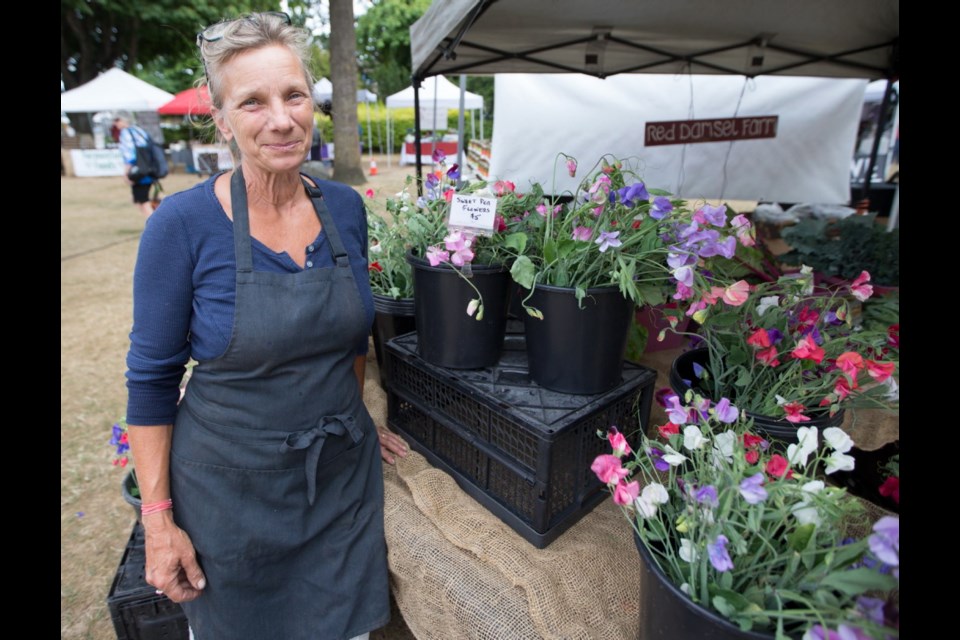Sustainability, innovation and community spirit were abundant Thursday evening at Memorial Park, the new home of the Esquimalt Farmers Market.
An eclectic crowd of marketgoers began gathering in the late afternoon as the sun played tag with the clouds, before singer Lily Cave began setting the mood with a diverse set of popular music.
Katrina Dwulit, the vibrant community market’s irrepressible leader, credited her team of volunteers for making E-Town’s popular weekly event a model of environmental and economic sustainability.
“The main lesson I’ve learned is that Esquimalt is just the most wonderful community,” said Dwulit, who moved here eight years ago. “People are very community-minded and quick to support if you ask for help.”
Randomly polled marketgoers and vendors voiced enthusiasm for the new location (1230 Esquimalt Rd.) for the market that originated behind Esquimalt Municipal Hall three years ago.
“We were evicted because of development of the Esquimalt Village Project,” said Dwulit, whose team is encouraging visitors to walk, cycle or take the bus.
The sustainable transit push was motivated in part by a need to close Park Terrace from 2:30-8:30 p.m. on Thursdays to accommodate food trucks and provide space for vendors to unload their wares.
Parking is always an issue, said Dwulit, noting the non-profit society has had to hire flag-wavers to keep roads safely controlled, an initiative with a $6,000 price tag.
Money is being raised through fundraisers, including a recent comedy show in partnership with Hecklers that raised $1,800.
A head-turning example of the market’s zero-waste philosophy was The Burlap Shoe, a local initiative that made its debut there Thursday.
“It’s plastic-free July, so we got a call asking us to spread the word,” said Nairn Flucker, an aquaculture technician who founded the online zero-waste solutions project with his fiancee Paula, a marine biologist, six months ago. “It’s a small underground movement now, bigger in other countries but Canada is slowly catching up with zero-waste grocery stores in terms of people wanting to get away from single-use plastic items.”
The couple’s aim is to provide reusable alternatives, resources and products, said Flucker, surrounded by planet-friendly products including bamboo toothbrushes and a kitchen scrubber made from coconut fibres.
“Waste is a new problem, unfortunately. Your parents didn’t have to use single-use items. So we’re going back to the way it used to be, which is nice. We can’t keep going with this wasteful consumerism.”
Shellie MacDonald, who runs Red Damsel Farm on West Saanich Road, explained the market’s appeal while selling fragrant sweet pea flowers and organic fruits and vegetables.
“It’s ultra-local, supporting the local economy and growing food sustainably,” she said. “Farming is about community and Esquimalt is all about community.”
Standing near a sign declaring “It’s not jam!” at her Kettle & Hive stand, Trish Francis fielded questions about her colourful jars containing concentrations of lemon and honey.
“It’s the natural pectin in lemons that makes it gel,” explained Francis, adding you can make teas by adding hot water to a spoonful of the mixture.
“This is our first experience with markets in general, and I wanted to make sure I was getting in with the right people,” said Francis, who was inspired after seeing a co-worker struggling to make tea by slicing lemons on a cutting board to mix with honey and boiling water. “It looked like such an ordeal. I thought, ‘There must be a better way to do this.’”
Meanwhile, over at Bright Greens Canada, Tamara Knott sold microgreens and salad mixes grown on her year-round hydroponic farm housed in a repurposed shipping container.
The urban farmer said she uses 90 per cent less water than conventional means to produce green crops sold to local restaurants.
“I can grow 100 pounds of kale, lettuce, mustard greens and culinary herbs in a week. The weather has no impact, and the deer, rabbits and slugs can’t get in.”
Another people-magnet was the LifeCycles stand, where marketgoers could sign up to volunteer for the biodiversity association’s Fruit Tree Project.
“We have people all over Victoria who have fruit trees but may not be picking them,” said Braydi Rice, 25, explaining how fruit is harvested from privately owned trees and redistributed to food banks, community groups and volunteers. The locally sourced fruit is also used to make products in partnership with Spinnakers, including apple cider vinegar and its Backyard Blend apple cider.



